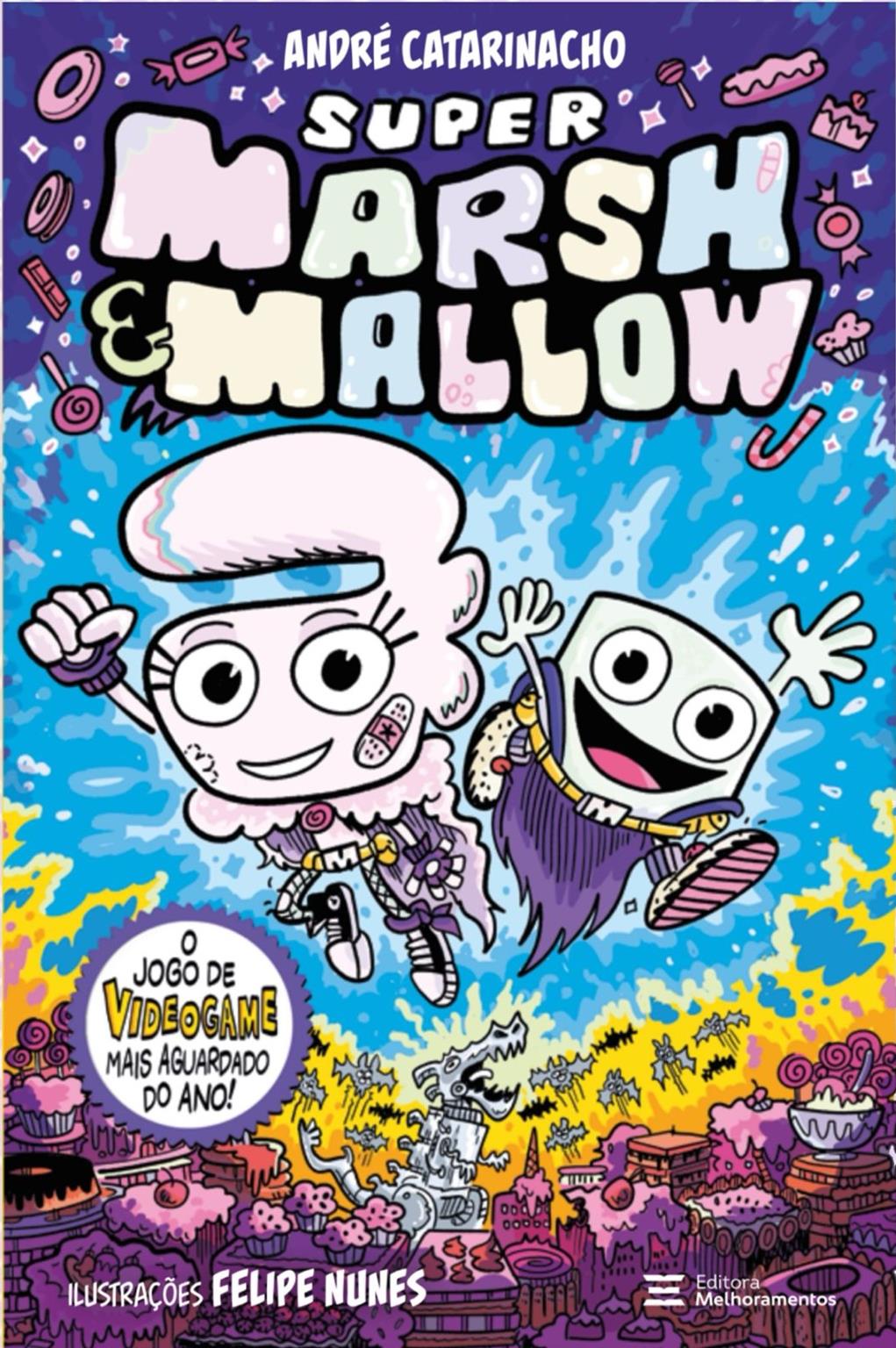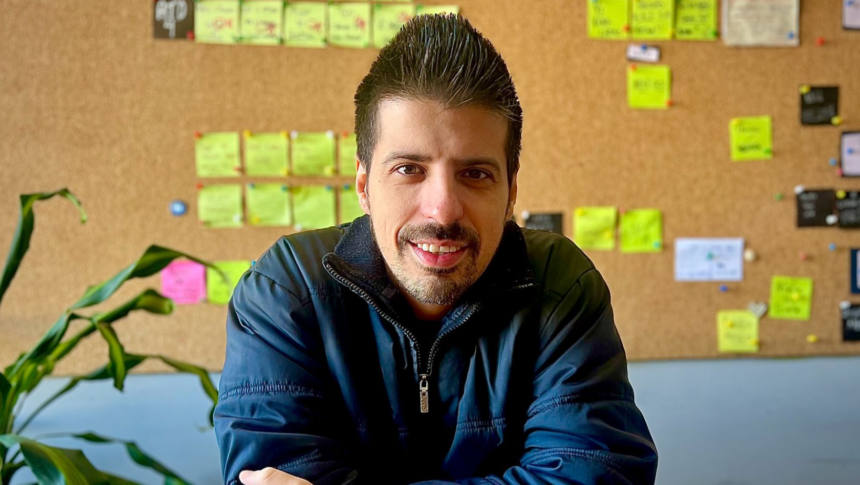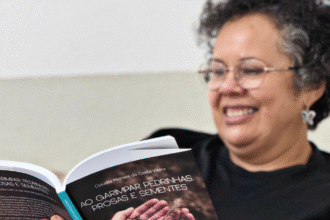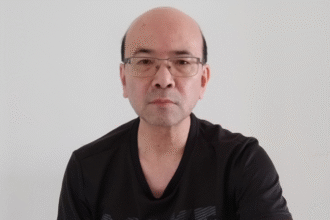André Catarinacho , a screenwriter nominated for an International Kids Emmy in 2021 and creator of the hit series “Bugados” and “Diário de Luli”, makes his literary debut with “Super Marsh & Mallow ” (Ed. Melhoramentos). In the format of a gamebook , the work combines humor, adventures within a video game and an inspiring message about empathy and friendship, as two unlikely heroes — limp marshmallows — face bullying and become protagonists on Ilha dos Doces. The book, which features illustrations by Felipe Nunes and the endorsement of Pedro Bandeira in the blurb, promises to win over children and teenagers by integrating the dynamism of games into the literary universe.
With over 150 episodes written for television, you are now making your literary debut with Super Marsh & Mallow . How was the transition from the series universe to the literary format and what inspired you to create this story full of humor and empathy?
A very personal element inspired me to create Super Marsh & Mallow . When I was a child, it was video games that helped me have a more sociable childhood, to open up to the world and make friends that I wouldn’t have made without games. Video games didn’t just bring me excitement on screen, but they also gave me a sense of belonging off screen. I’ve always wanted to write a children’s story that addressed this characteristic that is so particular to my childhood, and at the same time common to so many people of my generation.
Regarding the difference between audiovisual and literature, I think that coming from a vast experience in audiovisual, especially in Bugados, was essential for Super Marsh & Mallow to exist the way it does. In Bugados, as you said, we wrote more than 150 episodes. Since each of them had three plots, there were more than 450 stories told and filmed over the course of six seasons—not to mention the ocean of stories that we discarded along the way. We did everything there: we created and tested plots, innovated in formats, applied several screenwriting theories in practice, played with genres, themes, tones and styles. We got a lot right, we got a lot wrong too, we learned and evolved by practicing the creation of such a large number of stories and, certainly, this shaped the way I write. Today, for me to feel motivated to dive into a story, it needs to have something more. It needs to be truly original or stir some very particular feeling in me. “Super Marsh and Mallow ” offered me both of these things.
Furthermore, freedom is also one of the main practical differences between screenwriting and literature. Although creative limitations are always welcome and act as a driving force for the imagination to shine, there is no denying that, in Brazilian audiovisual production, creativity is born hand in hand with budgetary limitations. Literature, on the other hand, is the most fertile backyard for imagination. Playing with this freedom to the fullest is what I tried to do with Super Marsh & Mallow .
The relationship between children, games and literature is a central theme of your book. How do you see the role of video games in children’s education and development and how does Super Marsh & Mallow relate to this universe?
I believe that many people still have the idea that video games compete with literature. It’s that classic idea: “you could be reading instead of wasting time on that game…” as if one thing were automatically exclusive of the other. They are not. Video games and literature can be complementary forms of storytelling and learning.
As someone who grew up with a Mega Drive in my room, I disagree with anyone who portrays video games as the villain of the story. Video games are an art form. I remember the first time I read “My Sweet Orange Tree” and how it impacted me. I remember how I felt when I finished reading “ Matilda ” in the school library. I remember finishing reading “Sophie’s World” when I was 14 and how it made me want to know all the philosophers. I remember how I was blown away when I first watched “The Neverending Story,” “Pulp Fiction, ” and “Toy Story 3.” And, similarly, I remember the impact I felt when I finished “ Pokemon” for the first time. Red ”, “Mario 64” and “The Last Of Us”, I remember how I got involved with an immigrant family living in Canada while playing “ Venba ”, I remember how light I felt when I finished climbing the mountain in “Celeste” and helped Madeline face her depression.
What I mean by this is that video games have powerful stories to tell, just as much as any other medium. But of course, we need to make a caveat here. Not every game is art. Maybe, I don’t know, only 5% of it is. Just as there are books that add little to the reader’s experience and movies that are nothing more than empty distractions, there are also games that only want clicks, that are focused on capturing the player’s attention and leveraging microtransactions at all costs.
With Super Marsh & Mallow , my goal was to create a bridge between these worlds — the playful and dynamic universe of games and the enchantment of literary stories. I think that educators and parents need to view video games with less negativity, because denying their relevance is fighting against the reality that has already been imposed. On the other hand, understanding video games is understanding a new language of childhood.
Cecilia’s story addresses friendship and empathy in a light and touching way. Why did you choose to explore these themes and how do you think they can impact young readers?
The world today is lacking empathy – and we need to talk about it, especially with children. One of the things I’m most proud of in Super Marsh & Mallow is having found a way to approach empathy in a light-hearted yet profound way, without falling into a moral lesson. The book talks to children as equals, horizontally, through comedy and entertainment.
Given this scenario, I believe that video games can be great generators of empathy, especially in games that deal with choices and consequences. There are several games that put us against the wall and force us to make decisions that have great emotional consequences. My thought in “Super Marsh & Mallow ” was to put a magnifying glass on Cecilia’s choices, always from the perspective of empathy. In particular, one of the most touching moments of the story occurs in the final third, when Cecilia finds herself facing Vladinídeo , the bat-spider , and has to decide whether or not Marsh and Mallow should deliver the coup de grace that could end him forever. It is a decision full of nuances, which reflects on how we see the other, even when he is considered a villain.
We can never predict for sure what each reader will get out of a book, because the reading experience is unique. Some readers will laugh out loud at Mallow ‘s jokes , others will be inspired by Marsh’s determination, others will like Doctor Pudding’s story, some will identify with Vladinídeo ‘s pain , some will find everything boring and put the book aside, and others will reread it several times carefully to capture more details of the story. But just as Cecília came out of the experience of playing Super Marsh & Mallow more sensitive to the world around her, I like to think that readers will finish the book feeling a little more empathetic towards the world around them. I could be wrong, but I don’t think it’s utopian to dream of a sweeter world.
The idea of a ” bookgame ” is quite innovative and promises to engage readers. What was the biggest challenge in creating this interaction between reading and gaming and how do you believe this brings new generations closer to literature?
Super Marsh & Mallow is a book about the power of art and how it can transform our lives. To explore this theme in depth and create this feeling in the exact way I wanted, I always had a clear idea that it would be written in two narrative lines: one inside and one outside the game. The biggest challenge was precisely this: to structure these lines without allowing the reader’s fictional breath to be diluted in either part.
To achieve this, the first step was to create the game. I wanted something nostalgic, from the 16-bit era, and at the same time modern. I also wanted to bring all the classic and recognizable moments from the video game: choosing characters, clothes, exploring caves, finding hidden items, jumping over spikes, getting involved in epic fights, losing lives, opening mysterious chests, etc. Within the game, the text needed to be agile, fast-paced, written in the present tense, without access to the characters’ thoughts, and with lots of illustrations. With Felipe Nunes joining the project, we discussed each of the illustrations together and his talent made the game come to life in an even better way than I had imagined.
The second step was to create the ‘outside the game’: Cecília’s real life and everything that happens behind the screen. Since the book takes place 80% inside the game and 20% outside it, I decided to create a strong cliffhanger – or, in this case, a tragedy – so that the reader would always be in a state of curiosity and wondering… what could have happened? Furthermore, outside the game the text style is completely different: a more lyrical literature, with a slowed down rhythm, depth and access to Cecília’s most intimate thoughts.
From this mix, a result was born with its own rhythm and dynamics that connects with children in a special way.
Today’s writer must always look for new ways to tell stories. We live in an era where the breath of fiction has never been so low: if we don’t like the first fifteen minutes of a film, we give up watching it and move on to another one; if the first ten seconds of a video don’t engage us… we’re already scrolling; books and more books are abandoned halfway through… The stimuli have changed. Our relationship with time has changed. Or rather: our relationship with wasting time has changed. As we lose readers every year, we have to find ways to keep young people engaged. We can either sit back and complain, or try new things. Super Marsh and Mallow is an attempt to create something new.

With the blurb written by Pedro Bandeira, Super Marsh & Mallow was born with a great deal of weight. What was it like to receive this recognition from an icon of Brazilian children’s and young adult literature?
It was surreal. Pedro Bandeira is a pillar of Brazilian children’s and young adult literature. He is part of the emotional memory of those who grew up reading in Brazil, and having a foreword by him, right in my first book, was a joy that I will always keep in my heart. But I believe that this is not only about recognition, it is also about responsibility. It is a reminder that I have to continue creating stories that respect children’s intelligence and literature, as he always did.
You mentioned that the book helps demystify the relationship between young people and games for parents. What would you say to a parent who is still worried about the impact of video games on their children’s lives?
I would say that it is essential to be careful with what children play on video games and to set certain limits, just as we do with what they watch on streaming services and the content they consume on the internet. Setting limits is part of the role of those who care for them, but what I advocate is that it is not the video game itself, in a macro sense, that is punished. For the adult who still thinks that video games are the villain, Super Marsh & Mallow is an invitation to reframe this view.
In an increasingly dangerous world, games can be a safe space where children find adrenaline, where they experience high doses of emotion, where they suffer the pain of failure, celebrate the joy of success, where they learn to win and lose, and where basic emotions are felt at high voltage. If a child likes a game, sit down with them and understand: why is that game important? What other games can you introduce them to? How can you gradually introduce more relevant games? How can the lessons learned from video games contribute to real life? Video games do not necessarily have to be an abyss for children’s world. The important thing is that this universe is explored with curiosity and dialogue.
Your previous works, such as Bugados and Luli’s Diary, are marked by vibrant imagination and deep themes. How did these experiences influence the development of Super Marsh & Mallow and what can readers expect from you in the future?
I believe that my previous projects brought me more experience, narrative maturity and an even greater certainty in my desire to continue creating and telling stories throughout my life.
As for the future, the next few years promise good news: in 2025, I will make my theater debut with “Tv Colosso – O Musical” and will launch two new books. In 2026, if everything goes well, we will premiere the first Karas film by Scriptonita Films and Conspiração : “A Droga da Obediência”, based on Pedro Bandeira’s bestseller — in addition to other projects still in development that I can’t wait to share. It will be hard to control my excitement. There are a lot of good things coming.
Follow André Catarinacho on Instagram





